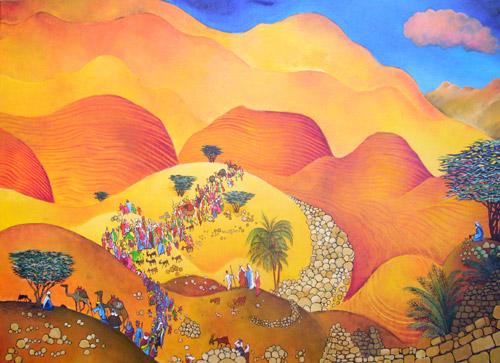Zechariah has been given a message from God composed of eight visions. The first three focus on the whole community and are about the priority of rebuilding the Temple, as we have seen. The next two visions, in chapters 3 and 4, are focused on two key leaders: Joshua the high priest and Zerubbabel the governor. So the concern shifts here from the task itself to the human instruments God is using to complete it.
In chapter 3, Zechariah shares his vision of a courtroom trial about to begin. The defendant is Joshua the high priest and the prosecuting attorney is Satan, the Accuser. This is a serious matter because according the Law of Moses the high priest is the one person designated to represent the people in standing before holy God. In His presence, he would offer sacrifices of repentance and receive atonement of sin from God.
Only the high priest could enter the Holy of Holies in the Temple, and this only once a year. In the vision, Joshua’s clothing is filthy, meaning that he is spiritually unfit for this role, which Satan the Accuser is only too happy to point out. Joshua represents the condition of all of us.
But then something unexpected and wonderful happens! God rejects Satan’s accusations and declares Joshua to be a saved man and righteous in His sight: “This man is like a burning stick that has been snatched from the fire” (Zechariah 3:2).
What happens to Joshua is important to understand because it reflects the heart of the biblical story: “See, I have taken away your sins, and now am giving you these fine new clothes.” This is what God’s grace does. It makes unworthy people righteous in His eyes. But this also raises a question. Does God’s grace imply that our sins don’t matter?–that God simply ignores them and lets us go free? Not at all!
Verses 8 through 10 mention that our sins are removed by the agency of God’s servant, “the Branch.” This is a technical term for the Messiah, who would be the ideal future king of David’s line and who would remove sin. So God’s grace is offered to sinful people because God’s servant bears all sin.
Satan the accuser is right. Joshua, and all of us, are sinful and unworthy of standing before God. But by God’s grace, the force of his accusation is dismissed and we are set free.
In chapter 4 another vision is given. This time it is of a solid gold lampstand with a bowl of oil on top of it. Around the bowl are seven lamps, each having seven spouts with wicks. One olive tree stands on each side of the bowl.
The two olive trees represent Joshua and Zerubbabel. The lampstand represents the people. The olive oil in the bowl, which flows to the seven lamps, comes from the olive trees. Therefore, the vision reveals that Joshua and Zerubbabel are the leaders through whom the Lord will lead and nourish the community in their work of rebuilding.
The lampstand will be kept burning by Spirit-directed leadership. It is the way God always leads His people and does His work in the world. As the Lord famously says to Zerubbabel: “It is not by force nor by strength, but by my Spirit says the Lord” (Zechariah 4:6).
So the work of rebuilding begins again. A humble beginning perhaps, but we are cautioned: “Do not despise these small beginnings, for the Lord rejoices to see the work begin” (Zechariah 4:10).
Prayer: Lord, thanks for reminding us that you do big and small things in the world through human agency. You have honored us by including us as your partners in bringing new life to a broken a world. We are unworthy for this task, but you have made us worthy through Christ. Thank you for your continuing mercies. Amen.

